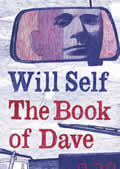Podcasts
thepenguinpodcast.blogs.com
Television
Will has recorded an interview for Newsnight, which is scheduled to be aired on BBC2 Thursday June 1. You can still watch it here.
Magazines
There’s an interview with Will in the May edition of Esquire (who describe The Book of Dave as ‘his most imaginative, most dazzling and most moving book yet’). There will also be a piece by Will in the July issue of GQ, and a short story of Will’s is going to run in the July edition of Harpers Bazaar.
Newspapers
Will’s piece about London cabbies appeared in the Independent on May 18 along with an extract from the novel in the Independent on Sunday that week. There was also an interview with the man himself in the Daily Telegraph on Saturday.
Radio
Will has already done a preview reading from The Book of Dave on Radio 3’s The Verb, and talked about the book on Radio 4’s Start the Week, and he’ll be interviewed on all major national radio stations around publication:
Radio 4 Front Row (7.15pm, Tuesday May 23)
Radio 3 Night Waves (9.30pm, Thursday May 25)
The book will be reviewed on Radio 4 Saturday Review (7.15pm, Saturday May 27)
World Service The Word (Monday June 5)
Radio 2 Steve Wright (2pm, Monday June 5)
Radio 5 Live Simon Mayo (1pm, June 8, Thursday)
Festivals and readings
Will will be charming the crowds at all the major festivals this year – he had a standing-room-only audience transfixed at the Swindon festival last week, and upcoming dates include
the Guardian Hay Festival (11.30am, Sunday May 28) www.hayfestival.com
The Bloomsbury Theatre, in conjunction with Blackwells (June 8 Thursday) www.thebloomsbury.com
Waterstones, Birmingham (Monday June 5) Call 0121 631 4333 for tickets
The Broadway Theatre, Nottingham (6pm, Tuesday June 6), Broadway box office 0115 9526611
Waterstones, Leeds (7pm, Tuesday June 13) Call 0113 2444588 for tickets
Borders, Oxford (Monday June 19) Call 01865 203901 for tickets
The Phoenix Theatre, Leicester (7.30pm, Tuesday June 27) Call the box office for tickets on 0116 255 4854
City Books, Brighton (Wednesday June 28) Call 01273 725306 for tickets
Edinburgh International Book Festival (August 12, 12pm with Rick Moody and August 13, 3pm with Edward St Aubyn) www.edbookfest.co.uk
Cheltenham Festival of Literature October 14th 2006, times tbc) www.cheltenhamfestivals.com/whats_on/literature_festival.html

